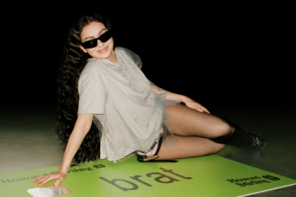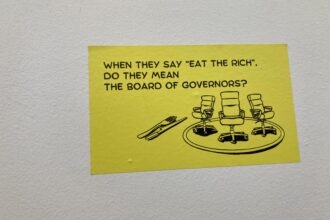A love for music and high-energy performance sparked the beginnings for the boys of Busty and the Bass, all nine members alumni of McGill University. From chill weekend gigs at Gerts (McGill’s student bar) to performing this coming summer at Osheaga, one of the most annual hyped indie music festivals in the north, Busty and the Bass has made McGill proud with their blended yet eclectic sound.
After winning TD Canada’s Rock Your Campus music competition in 2014, the band has continued to promote their collective of electro-soul, hip-hop, and dance music to impressed crowds across North America. Eric Haynes, Busty’s resident keyboardist and Milo Johnson, the band’s bassist, shared with us some inklings on the impact of their education at McGill as musicians and other musings about their craft.
Who are your musical inspirations?
Eric: Our musical inspirations are probably as diverse as our backgrounds. I mean, we’re a nine-person band and we’re all from different cities all across North America so in our music, we have all sorts of influences—from hip-hop to funk to soul to R&B; all sorts of stuff really. It’s tough to narrow it down for a specific set of influences for the band. For me personally, even that’s hard.

Photo courtesy of Kelly Jacob
Milo: That’s a funny question. Actually, in prepping for the album that we’re working on right now, we found ourselves naturally listening to some albums in the tour van over the summer. There was a lot of D’Angelo, Frank Ocean, James Blake, Chance the Rapper, Dr. Dre… I like Parliament-Funkadelic a lot. It’s a funny question because most bands will probably give you a cut and dry answer to that but with us, it depends on which one of us you’re interviewing and what day of the week it is.
Eric: Yeah and also, for every track, there is a different set of influences that will go in there, you know? It’s a tough question to answer because we’re pretty all over the place.
What was the highlight moment of your time at McGill?
Eric: For me, it was definitely the show in our fourth year (U3), where we got t
o open for the Arkells. That was really great and it was part of winning TD’s “Rock your Campus”. That was probably the biggest show we had done up until that point and all of our friends and the McGill student body had supported us through the competition. It was really nice to feel like we had a chance to give back to them with a free concert. It was really fun.
Milo: I really liked OAP (Open Air Pub). Every OAP show we did was pretty slammin’.
Eric: I even have really fond memories, for some bizarre reason, of the Gerts gigs that we did that in our first couple of years of getting started.
Milo: Yeah, we would be playing for 3 gigs a month for the entire year.
Eric: We played at so many Gerts shows and we would have to bring our own sound system and Chris, our trombone player, would often have to set it up, do sound check, and usually something would break during the show. So it’s always a good time.
Milo: Fond memories of course.
I cite Montreal as a city as much more influential than just McGill. I think it’s always surrounding factors that contribute to your education, not just where you went to school or what you studied.
What is your definition of success?
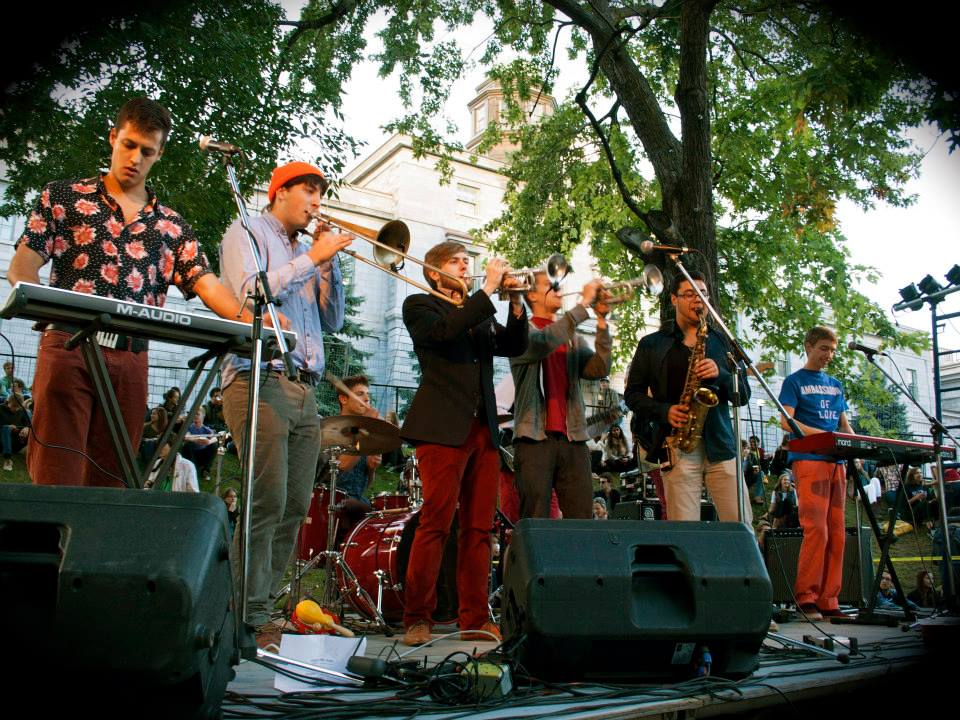
Busty Performing at OAP. Courtesy of Kyle Hutchins.
Milo: I think every person’s definition is going to be different. I’ll expand on it a little bit; one thing that I sort of found as we’ve come up is, if you define success by comparing yourself to other people, you’re never going to be actually happy because you’ll continue to keep striving for the next thing and never actually be fulfilled. Whereas if you define success in your own terms, you’ll be a lot more fulfilled and therefore achieve your goals easier than constantly trying to be like “oh we just need to get to where those people are at!” or like “where these people are at”. So I think, for me personally, in the context of being a musician, I define success as making stuff I’m fulfilled by and making a living off of it.
Eric: As a band, we’ve had a lot of different goals on sort of our path to success. Not to say that we feel like we’re successful at the moment. We’re always sort of striving for the next thing. But whether it’s being able to sustain ourselves through our music or reaching as many people as we can, or even just making a full-length album, making music that we’re really happy with and all contributing to; there is a whole variety of goals that come in our definition of success.
Milo: I think on a grander scale, somebody’s successful if they’re achieving or exceeding the goals that they have set for themselves…if you got a good suit, a corner office, and fancy business cards and a title. Then yes.
Eric: Which we all do!
Milo: Yeah, everybody here’s got a title.
How do you think being part of a band while inschool helped you develop as people?
Eric: It’s a huge thing to be able to work in such a large group. For me at least, it really contributed to my understanding of how to work with people both individually and in the context of a group and also what were my specific strengths and weaknesses are in terms of being able to contribute to the group’s progress or to the vibe of the group. For me, it was definitely a lot interpersonal growth through being in the band. It’s also interesting because we started playing in our first week of school so I’ve known these guys for five years now and it’s cool. There’s definitely been a lot of growth between me and other people [of the band].
Milo: Yeah, I’d echo that statement. Pretty much spot on. It’s the same thing as doing anything “real” while you’re in school; it gets you out of your school box and makes you realize that there’s so much more shit in like actually putting something together than you think of. I guess that was one of the biggest things outside of the interpersonal stuff for me, it’s just like, all of the blockades that come up on your way of trying to do stuff; it actually forces you to deal with those as opposed to just think of them, or not even think about them. So that was a big thing for me. They teach you certain things about how to be a musician and how to be a band while you’re in school but they don’t teach you anything about these others things, which is exactly what we learned as we were developing. The best part of meeting in school was that we actually had time to learn as opposed to getting just thrown completely in the deep end. We grew so much as people, as musicians running a band, and every other facet of being in a band so if we hadn’t had the time in school, we would have been completely fucked.
Eric: That’s spot on. Also, if we also didn’t have that time, before we concerned about making a living and all of the realities of life, maybe we wouldn’t have been able to get the personal bonds that have been able to sustain us so far in a band. But also just in terms of themusic industry, I’ve learned so much more about the business of being a musician than we were ever taught in school by being in this band. I would encourage anyone reading to take up a project they feel really passionate about and even if they don’t feel like it’s going somewhere, just pursue things outside of school and see what happens. Say yes to as much as you can.
On the same note, how do you think your education has impacted your music?
Eric: I think there were some flaws in the music program that we had at McGill and the most of which sort of centred around a lack of clarity about what it takes to be a professional musician and make a living as a musician in the world of today; whether it’s in the internet, the economy, or just how the city of Montreal works. But, that being said, I did learn a lot from the program both in terms of technical ability on my instrument and also just in a sort of a way to learn that can be applied to any music. I studied Jazz but I can take a lot of those principals and to sort of become more proficient in other styles of music as well.
Milo: I think for us, it definitely gave us a shared language that we use a lot.
Eric: It really taught us how to rehearse too, when we first started.
Milo: Yeah I think ultimately, the biggest thing school gave us was space and people. I cite Montreal as a city as much more influential than just McGill. I think it’s always surrounding factors that contribute to your education, not just where you went to school or what you studied. There are very few people that I know who went through a program in their undergrad and ended up working in a space that was exactly what they studied. It’s always the outside clubs and the hobby or skills that you develop that ultimately get you where you want to be and it was the exact same thing for us.
Eric: Yeah, and in terms of meeting people and making a network. That was a huge thing, both in terms of like, that’s how all the band members met; through the music program at McGill. Also in our first couple of years, when we didn’t have much of a fan base, it was a lot of our friends from our program that came out to see our shows and supported us, so that’s a really big thing too.
Being able to reach people through a performance even if it’s just by making them dance or making them feel good. When we perform, we’re just trying to have fun and hopefully make other people have fun too.
What are your favourite parts of music performance?
Eric: I just love being able to tour, go around and seeing new places, and playing music for new people and that hasn’t gotten old for me yet. It’s a really cool thing to do.
Milo: Ditto.
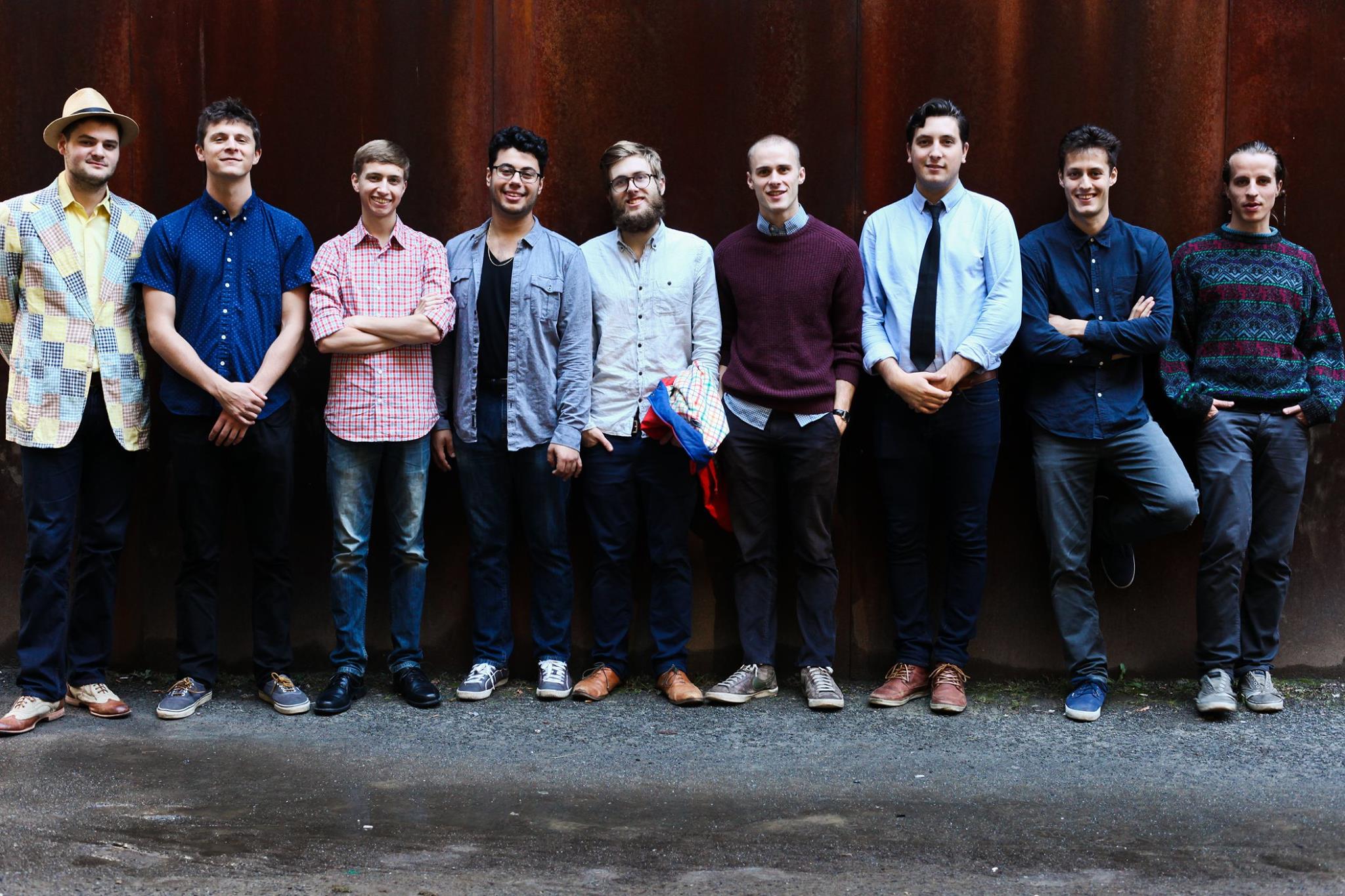
Photo Courtesy of Nat Carson
Eric: Being able to reach people through a performance even if it’s just by making them dance or making them feel good. When we perform, we’re just trying to have fun and hopefully make other people have fun too.
Milo: There is definitely something very special about seeing 800 people wave their hands like this *motions in the air*. It’s pretty sick
Eric: Yeah and we’re still trying to make our live performance as powerful as it can be but I feel especially in this age of DJs and EDM, it’s really powerful to see people actually playing music onstage and I think it’s a really different experience for our crowd.
What advice do you have for McGillians? Especially for those with dreams in music?
Milo: Go do stuff. I think that people take a really different approach to school and take a lot of different things out of it. I think in my own experiences and observations, the people who were full school all the time ended up graduating with a piece of paper and no idea what they were going to do. I think it’s a fucking privilege to have four years to be thinking about a few number of things and I think people waste that dicking around or focusing only on school. I would definitely say, go exploring, make connections, try to build shit while you’re still in school and you can fuck up and learn. When you’re out of school and having to support yourself, you’re not going to take the risk and start a nine-person band. That can be applied to any other person’s thing; when you’re out of school and have to support yourself, you’re probably not going to go for the reach job or the shit job that gives you enough experience to go for your reach job. I think that’s all stuff that happens when you’re in school and you’re young enough to do that.
Eric: Absolutely. I kind of wish I had done a better job of breaking out of the bubble whether it’s the bubble of the music school or the bubble of McGill. There is just so much going on in Montreal to experience and take part in that I would definitely urge people to do that. Also, [another piece of advice is] just to pursue your interests, even if it’s outside of your program or outside of what your teachers are telling you to learn about because that stuff that you’re just innately interested in, you’ll be able to find a place for it in whatever you end up doing and it’s going to give you a broad foundation of skills that you can apply to whatever you need.
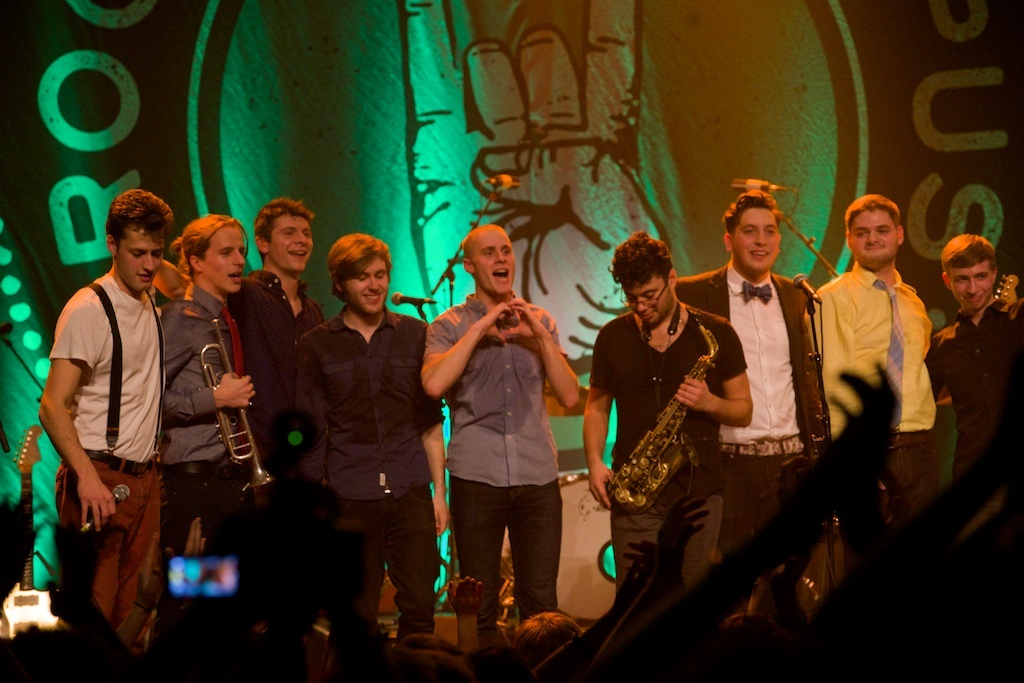
Busty at Rock Your Campus. Photo courtesy of Maxime Von Der Mühll.
Milo: Yeah, and I think also on that note, be really deliberate of going outside of what you’ve been comfortable with and what you’ve experienced because that’s the only way you’re actually going to find the middle ground. With me personally, I was doing a bunch of different things outside of music as well and it was ultimately those outside of music activities that made me realize and sort of see potential in Busty that ultimately influenced where we are now. I think it’s that same thing with a lot of my friends that aren’t musicians but were working in International Development and did an engineering degree. It’s always cross-disciplinary small companies that peak my interest at least and I think that you just have to start looking. All of this shit’s already out there and it’s so fucking easy too. Once you’re on the right train of thought, Google a company and email their contact email. The Internet is a very powerful tool and I think people forget that and just apply to the big posting that seven thousand other people are sending their resumes to. Maybe go for a lunch to a bunch of informational interviews. People say that relationships are everything and I didn’t really start to understand the meaning of that until the last couple of years. Nobody hires you because your resume looks better, they hire you because you are the best candidate or they know you. I think that was something that wasn’t stressed to me enough in school and I don’t think was stressed to very many other people.
Eric: Yeah, I feel like there is also a very big fear of failure and it’s really important to try things in spite of that. The other thing that Milo said that sort of made me think a little bit was seeing the potential in a project because when we started working together in the first year of Busty, which was basically just a jam band that played at house parties, I certainly didn’t feel a long term potential in that. It sort of took all of us a different amount of time to come around to the idea that this could be a really powerful long-term fulfilling thing for us to do. That just goes back to saying yes to as many opportunities as you can.
What message do you hope to deliver with your music?
Milo: I think in one camp, I want people to know that our shit is real because so much of what people are listening to is just like one dude who was really good at computer program. As cool as that is, there’s a limit to it and I think people are realizing that, which is cool, but that’s definitely a big thing people do realize when they come to our live show. Especially listening to our music, knowing that these are real musicians playing this together and it’s not just one dude and forty layers on a computer who presses space bar.
Congrats on Osheaga! How did you get this opportunity?
Milo: The Sparknotes version is that we worked with Evenko, the company that put on our Prom show that we did in our fourth year at Corona (Virgin Corona Theatre). Our manager knows a bunch of people there and they came out to our M for Montreal show in November. Then, one of their bookers had heard of us for a while and after seeing our show at Club Soda, we were in.
Eric: Shoutout to Osheaga for supporting emerging Montreal talent! That’s a cool thing for one of the dopest music festivals in North America to do.
Do you have any upcoming projects?
Eric: Yeah! We’ve been writing music basically since August and are currently in the studio recording. So in the next few months, keep your eyes out! We’re going to be releasing a bunch of new music that we’re really excited about and can’t wait for everyone to hear.
Keep up with Busty and the Bass by liking their Facebook page https://www.facebook.com/Busty-and-the-Bass-287992474554672/?fref=ts and following their Instagram and Twitter at @bustyandthebass



